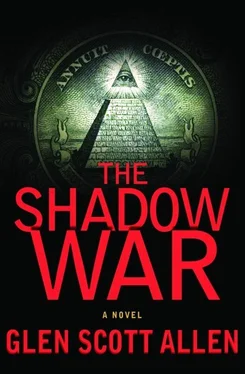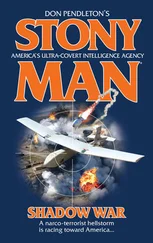Glen Allen - The shadow war
Здесь есть возможность читать онлайн «Glen Allen - The shadow war» весь текст электронной книги совершенно бесплатно (целиком полную версию без сокращений). В некоторых случаях можно слушать аудио, скачать через торрент в формате fb2 и присутствует краткое содержание. Жанр: Триллер, на английском языке. Описание произведения, (предисловие) а так же отзывы посетителей доступны на портале библиотеки ЛибКат.
- Название:The shadow war
- Автор:
- Жанр:
- Год:неизвестен
- ISBN:нет данных
- Рейтинг книги:5 / 5. Голосов: 1
-
Избранное:Добавить в избранное
- Отзывы:
-
Ваша оценка:
- 100
- 1
- 2
- 3
- 4
- 5
The shadow war: краткое содержание, описание и аннотация
Предлагаем к чтению аннотацию, описание, краткое содержание или предисловие (зависит от того, что написал сам автор книги «The shadow war»). Если вы не нашли необходимую информацию о книге — напишите в комментариях, мы постараемся отыскать её.
The shadow war — читать онлайн бесплатно полную книгу (весь текст) целиком
Ниже представлен текст книги, разбитый по страницам. Система сохранения места последней прочитанной страницы, позволяет с удобством читать онлайн бесплатно книгу «The shadow war», без необходимости каждый раз заново искать на чём Вы остановились. Поставьте закладку, и сможете в любой момент перейти на страницу, на которой закончили чтение.
Интервал:
Закладка:
And then she thought of one additional source to which she might turn for help.
Her father.
If this book-if it was a book-had something to do with the Cold War, and if it had in fact been somehow leaked to the samizdat press… well, then, it might be something her father had found in his own searching. Not that he would necessarily tell her about it. But she had nothing to lose by asking-other, that is, than suffering another of his inscrutable silences. And she hadn't called him in two weeks. This would give her an excuse.
She logged off and watched the screen go black. She put Fletcher's letter back in her desk drawer and locked it, then reached over and switched off the lamp on her desk.
She had taken her purse and coat and turned to leave when she paused. Taking her keys out again, she unlocked the drawer, took out Fletcher's letter, and put it in her purse.
She had no idea why she did this; it just felt right. Then she shrugged on her coat and walked down the hall to the elevator, her very non-Soviet high-heeled shoes creating echoes as they clicked on the white-and-brown-veined marble floor.
CHAPTER 7
Benjamin and Wolfe were sitting in the dining hall-a one-story brick building behind the manse and across a collegelike quad of open grass, trees, and cobblestone footpaths. Wolfe called it "the Trough." He'd brought Benjamin here after their examination of Fletcher's room so that he might listen to Benjamin's account of his "homework" with "some modicum of civilized comfort," i.e., a glass of orange juice laced with bourbon.
"Well, to begin with the most interesting, the book on Bainbridge, you need first to know that Hessiah Philadelphia Bainbridge was either a fanatic, or a visionary." Benjamin paused to sip his own black coffee, still feeling the effects of his nightcap. "Depends on which of the Puritan factions you asked."
"Factions?" Wolfe raised an eyebrow. "I think of the Puritans as all equally… well, puritanical."
"Not so." Benjamin shook his head. "There were left and right wings, just like political parties. Puritans like Cotton Mather, for instance, were ultraconservative and demanded absolute adherence to doctrine. It was Matherites that conducted the Salem witch trials. But on the other hand, there were Puritans like Jonathan Edwards, who believed in a certain individual liberty when it came to knowing God. And then on the far left were the Antinomians, sort of hippie Puritans, who believed in all sorts of things-almost all of which the Boston Elders called anathema. Which is why they were eventually exiled from Massachusetts."
"And this Hessiah Bainbridge, he was one of these Antinomials?"
"Antino mians. Not exactly. But when Anne Hutchinson and the other Antinomian leaders were sent packing, Bainbridge and his congregation went with them, to New Jersey. It isn't exactly clear why, except that he was a passionate advocate of the Prayer Town movement."
"Prayer Towns?"
Benjamin warmed to his topic.
"Prayer Towns were a revolutionary idea, at least for the period. You've heard of Eleazar Wheelock?"
"Well," Wolfe demurred, "if he had anything to do with Wheelock College in Boston, I have."
"Yes, same family. You know the little ditty about him? 'Oh, Eleazar Wheelock was a very pious man, he went into the wilderness to teach the Indian'? "
"Uh, no," said Wolfe, "can't say as I do." And he raised an eyebrow as though Benjamin had gone slightly mad.
Benjamin saw he was being kidded, smiled, went on.
"Anyway, he and Robert Gray and Hessiah Bainbridge all shared a dream: to build a whole town where the Native Americans could come to learn the English language and customs-and of course be converted to Christianity."
"Of course," nodded Wolfe.
"But Bainbridge was a lot more enlightened than most. He once wrote the Puritans should 'give the savages Civilitie for their bodies before Christianitie for their soules.' He even dared suggest they weren't just savages, that the Puritans might learn something from them. "
"Heresy!" pronounced Wolfe.
"Listen, it was all a helluva lot more enlightened than what the Matherites had in mind for the Natives. They preached about converting them, but it was no secret they'd have been just as happy to see them simply disappear. And if they had to help make them disappear, well, that was God's will."
"So that's what this Ginsburg book is about, this conflict between Bainbridge and those other Puritans in favor of genocide?"
"Well," Benjamin shook his head, "no, not exactly. That's just background. The book is about Hessiah's son, Harlan Phlegon Bainbridge."
"Phlegon?" Wolfe whistled. "My, they certainly had a way with names back then."
"It's a powerful name indeed. From the book of Romans, for 'burning zeal.' And according to Ginsburg, the name fit. Harlan kept at his father's work until he actually convinced a wealthy New Jersey merchant, Henry Coddington, to finance his father's idea."
"And where was this utopia constructed?"
Benjamin frowned. "No one's really certain, that's part of its mystery. It was completely wiped out some time in 1675, burned to the ground, by Wampanoag Indians. But it was somewhere out here, in western Massachusetts."
"And now the sixty-four-thousand-dollar question: whoever this Bainbridge was, why was Fletcher interested in him? Still think it had something to do with the Indian wars?"
"Native-Settler wars," Benjamin corrected, then frowned. "Ginsburg's book does make reference to one John Sassamon, someone connected to both Bainbridge and King Philip's War."
"King Philip's War? My Colonial history's a little rusty. Which king was that?"
"It wasn't really a king, it was the settlers' name for Metacom, chief of the Wampanoags, the most powerful tribe in the region. And King Philip's War was the bloodiest of the time. More people per capita were killed than in any other American war, even World War II; and it was the death knell for Native Americans, their Waterloo. They never recovered that kind of power or unity again. And this Sassamon and the destruction of the Bainbridge Plantation were involved in starting that war. So yes, normally I'd say that's why Jeremy was interested in Bainbridge."
"Normally?" Wolfe pried.
"Well…" Benjamin chose his words carefully. "There are several very strange things about this book. For one, I'd never heard of it, and as far as I know, neither had my father, even though he was much more the expert on the early Puritans. I need to read it again more carefully. I was falling asleep last night and-"
"Well, enough strangeness for now," Wolfe interrupted him, rising. "Let's deal with something definite."
He reached into his pocket and extracted a small appointment book that he tossed on the table in front of Benjamin.
"This was in Fletcher's office," Wolfe said. "It's a list of the people Fletcher had met with here at the Foundation. Or planned to meet with, before his… accident."
Benjamin opened the book, flipped past dozens of empty pages until he came to the pages for that week. • Monday, 10:00 A.M. -E. Stoltz • Thursday, 1:00 P.M. -E. Gadenhower • Friday, 10:00 A.M. -G. Soderbergh
"Gadenhower," read Benjamin. "Isn't that the woman who found his…"
"Yes," said Wolfe simply.
"And these other names?" asked Benjamin.
"Here, read for yourself." Wolfe handed him a brochure about the Foundation that listed the various fellows in residence with brief summaries of their credentials and research.
Benjamin discovered that Dr. Edward J. Stoltz was an historian and the official curator of the Foundation's collection of rare manuscripts, paintings, and other art; that Dr. Gudrun Soderbergh was an expert on "international relations and counterterrorism policy"; and that Mrs. Edith Gadenhower (no "Dr." before her name) was reported as "working on an innovative research project involving the social matrixes of bee colonies."
Читать дальшеИнтервал:
Закладка:
Похожие книги на «The shadow war»
Представляем Вашему вниманию похожие книги на «The shadow war» списком для выбора. Мы отобрали схожую по названию и смыслу литературу в надежде предоставить читателям больше вариантов отыскать новые, интересные, ещё непрочитанные произведения.
Обсуждение, отзывы о книге «The shadow war» и просто собственные мнения читателей. Оставьте ваши комментарии, напишите, что Вы думаете о произведении, его смысле или главных героях. Укажите что конкретно понравилось, а что нет, и почему Вы так считаете.












